Abberley and District Young Farmers’ Clubs – From Calf Clubs to a National Federation
- 26th August 2023
Are you a Worcestershire-based Farming Club or Society? Do you have records that chart the history of rural life or activities in Worcestershire? If so, we would love to hear from you! As we explore in today’s blog about Abberley and District Young Farmers’ Clubs, we want you to help us build upon our existing agricultural and rural archives about farming communities living and working in Worcestershire.
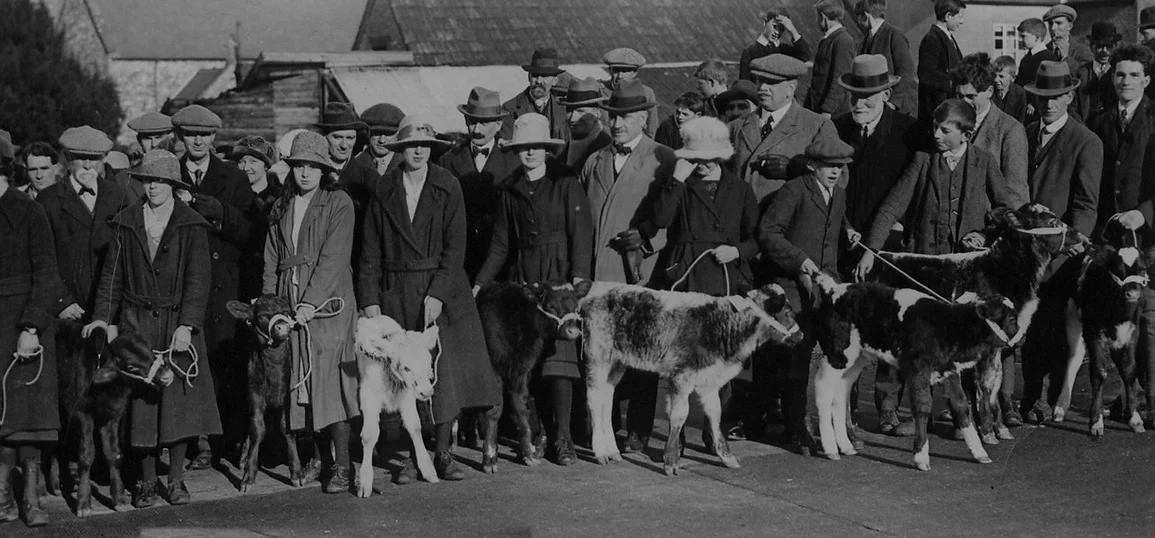
Hemyock Calf Club, Devon, 1921 reproduced from The Calf Club Centenary Group, Hemyock
Following the cataloguing of minute books and records about the foundation of the Federation of Young Farmers’ Clubs, from the perspective of the Abberley and District Young Farmers’ Clubs (A.D.Y.F.C.) we will explore their role in the farming communities in which they lived and served. Worcestershire is a rural county with a history of being at the forefront of agriculture and food production. Growing food in Worcestershire in the Vale of Evesham and Pershore has been an integral part of the landscape in the 19th and 20th centuries, shaping the people and the economy and as a way of life has been documented through our Market Gardening Heritage Project. Growing fruits and vegetables such as apples, asparagus and seasonable produce including hops and other arable crops continues to be vitally important to the regional economy. Livestock is also equally important in the West Midlands economy through poultry, dairy, beef, pig and sheep farming.
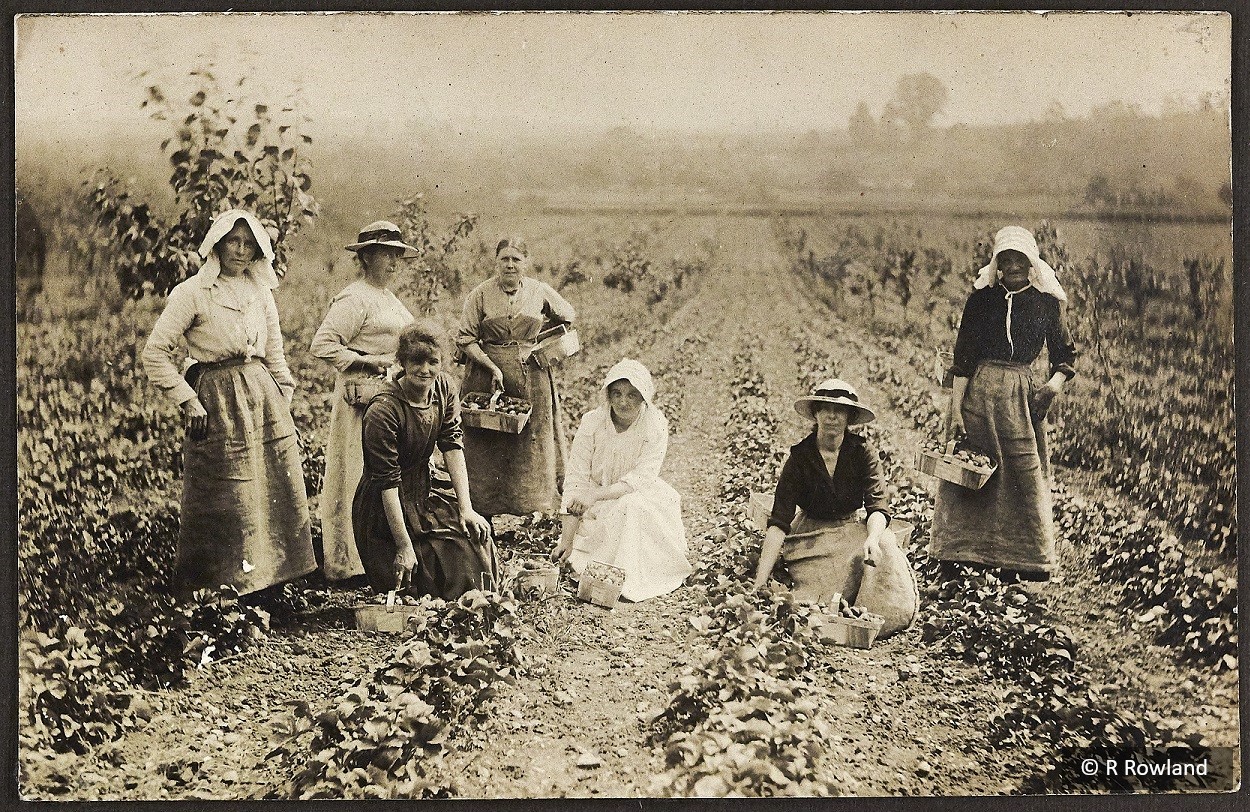
Strawberry Picking at Oxstalls Farm, Evesham 1920s © R. Rowland
The need to grow more food during and after World War II saw the establishment of the War Agricultural Executive Committee (with an increase in productive land of 1.7 million acres by 1940) traditional Market Gardening largely disappeared. Changes in farming production has certainly brought benefits and improved self-sufficiency but has also led to a nature-depleted landscape, for which farmers have been unfairly blamed, yet these changes have been driven largely by global food demand and government policy – one only has to look at the ever-changing policy on Hedgerow management over the past 250 years. The arrival of mechanised farming and commercial horticulture, along with changes in farming policy to increase yields and ensure more space to grow food for a booming population (and to respond to consumers changing tastes) has meant farmers have had to continuously adapt, innovate, and adjust to significant changes.
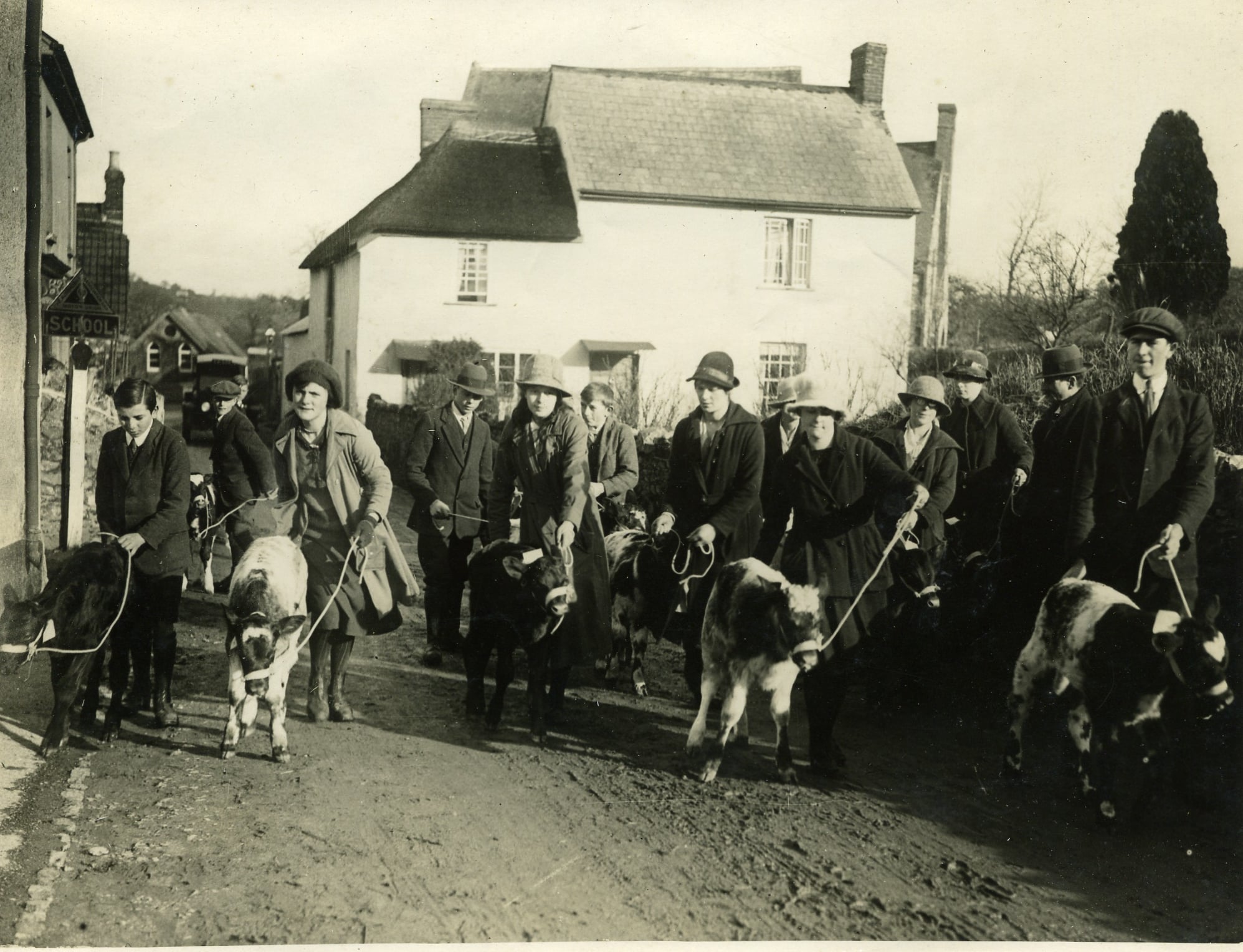
Calf Club owners parading their new calves through Fore Street, Hemyock, Devon, 1921 from The Calf Club Centenary Group, Hemyock
One such innovation – the origin of the Young Farmers Clubs themselves was the setting up of Calf Clubs, the first of which formed in Hemyock, Devon in collaboration with United Dairies (UD) in October 1920. Membership began with seven girls and twelve boys (aged 12 to 18) in 1921. Calf rearing and feeding for milk production were discussed and arrangements made by UD to distribute Shorthorn calves which they could rear at home (a farm or smallholding) for a year. The calves were judged first and given points at the start of the year. Members were given a pre-printed booklet to record monthly records of feed, costs and treatments, with calves judged at the end of the year.
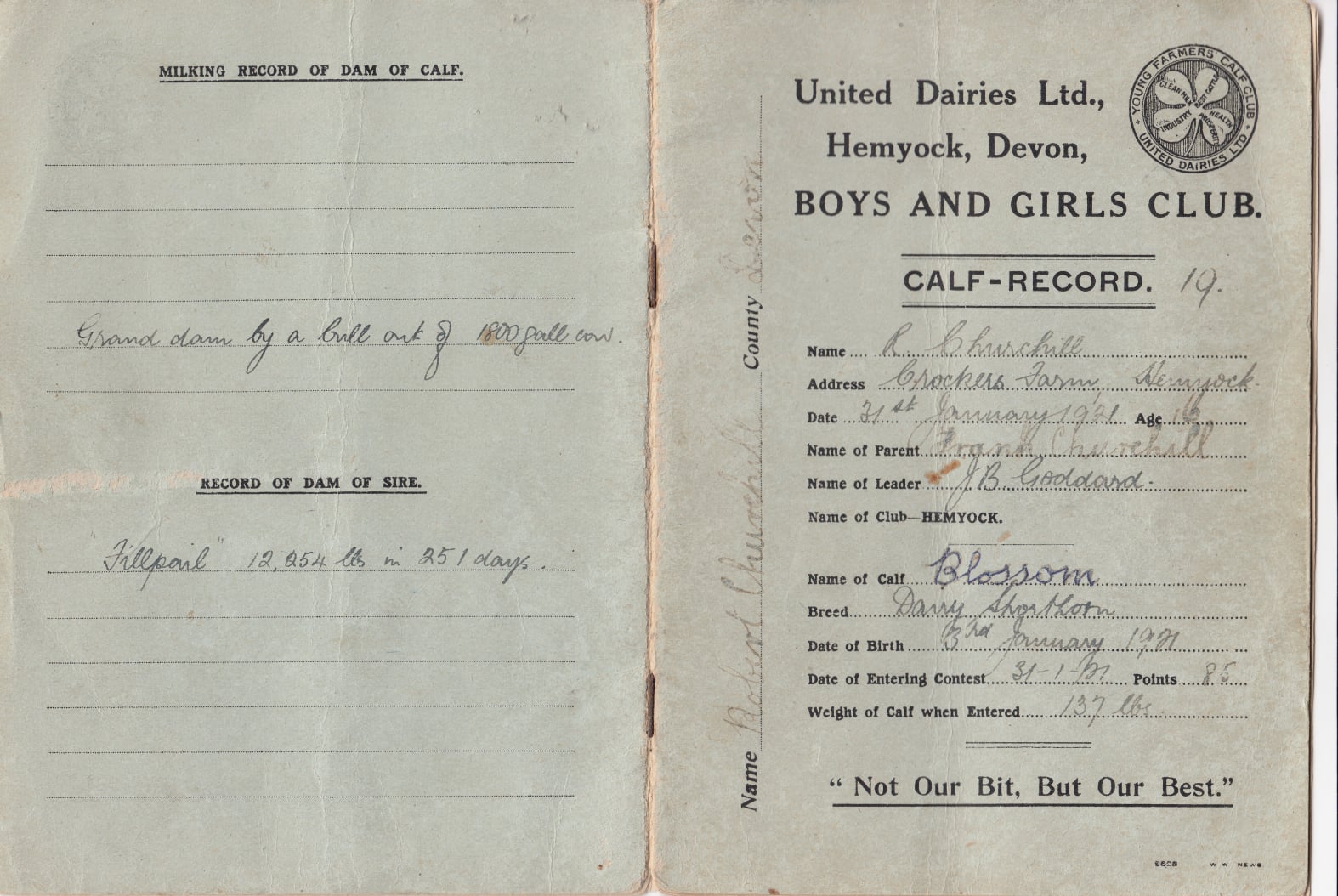
Robert Churchill’s Calf Club Calf-Record from January 1921 for ‘Blossom’ Reproduced from The Calf Club Centenary Facebook Group, Hemyock
Through auction, members could receive the difference between the original promissory note supplied by UD and the final bill or redeem the note and keep the calf. All were retained. Whilst initially funded by Lord Northcliffe, the Ministry of Agriculture took over limited funding in 1924. Hemyock Calf Club lapsed between the wars but re-formed after World War Two with a larger catchment and was renamed Culm Valley Young Farmers (CVYF). The Young Farmers Clubs were born and in 2021, Hemyock celebrated the Centenary with a sculpture, book and light parade.
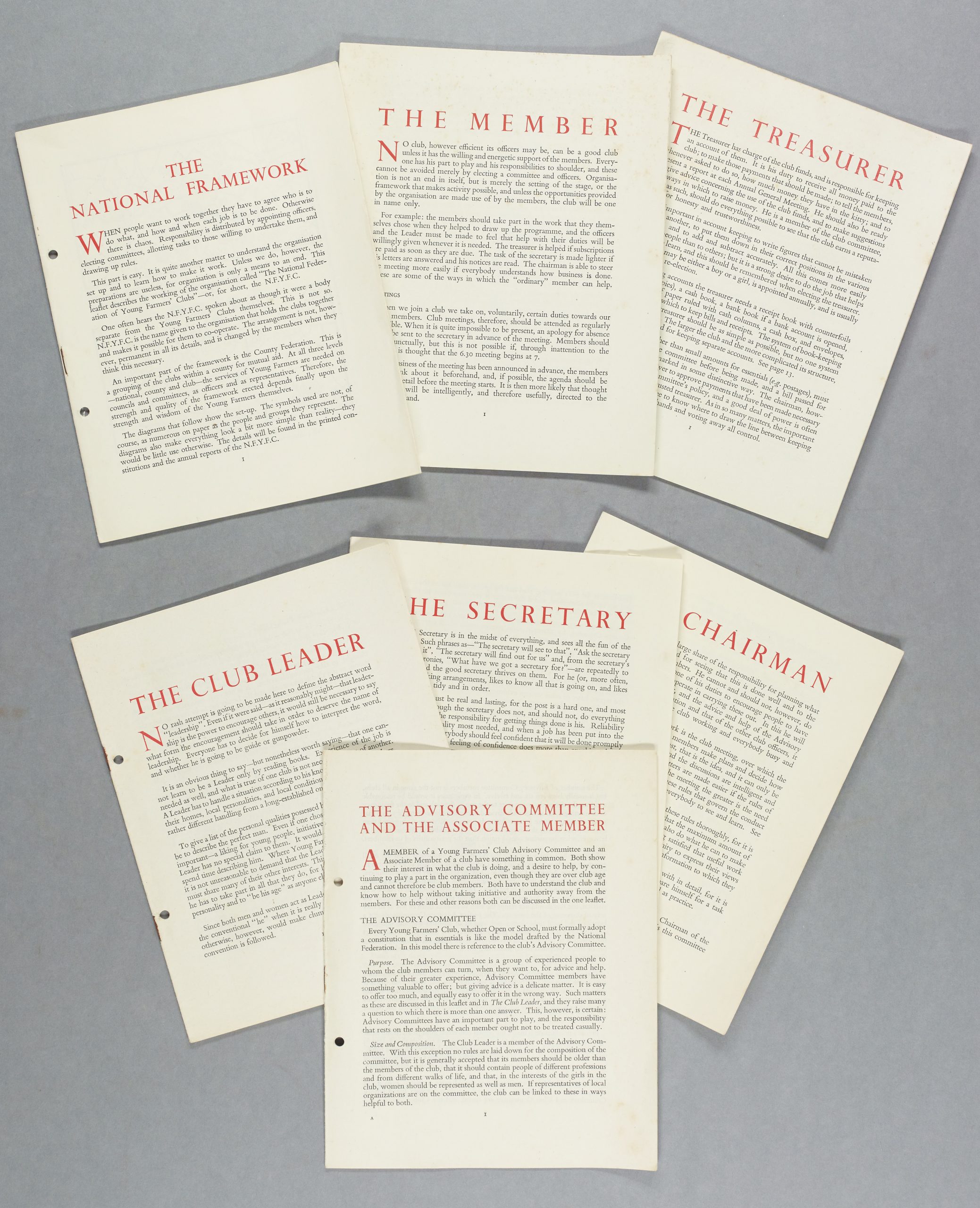
National Federation of Young Farmers’ Clubs N.F.Y.F.C pamphlets at Finding No: 705.651 BA16163.2.5i-vii c.1944-1955 © N.F.Y.F.C.
The Abberley and District Young Farmers Clubs records that have been catalogued date from 1956 up until the early 1980’s. Amongst the records at Finding No: 705:651 BA16163 are a series of pamphlets published between 1946-1955 by the committee responsible for establishing The National Federation of Young Farmers’ Clubs (N.F.Y.F.C.) at Finding No: 705:651 BA16163/2/5-6 which summarise The National Framework, The Advisory Committee and roles of The Associate Member, The Member, The Treasurer, The Secretary, The Chairman and The Club Leader.
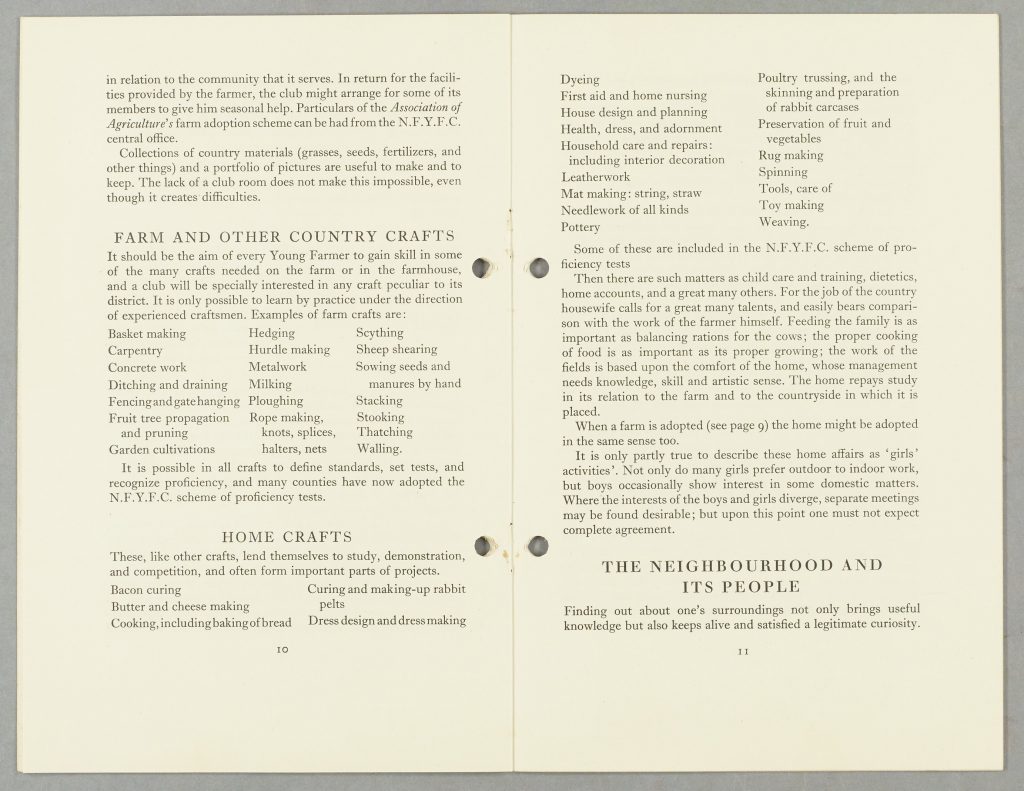
Farm and Country Craft activities in N.F.Y.F.C. ‘Club Programmes’ Finding No 705.651 BA16163.6 © N.F.Y.F.C.
The pamphlet describing Club Programmes is fascinating as it describes the breadth of knowledge and skills required of the farming community and the experiences that Young Farmers themselves could be involved in. The focus of the club programmes was varied and includes farming in its broadest sense from learning about stock, crops, soils to the farmhouse, farmstead or cottage to country crafts (indoors and outdoors), the countryside, ones’ neighbourhood and people, recreation and sport, the management of the club and its relationship with the N.F.Y.F.C. The example below summarises one Young Farmers Club approach that incorporates their motto of ‘Good Farmers, Good Countrymen, Good Citizens’.
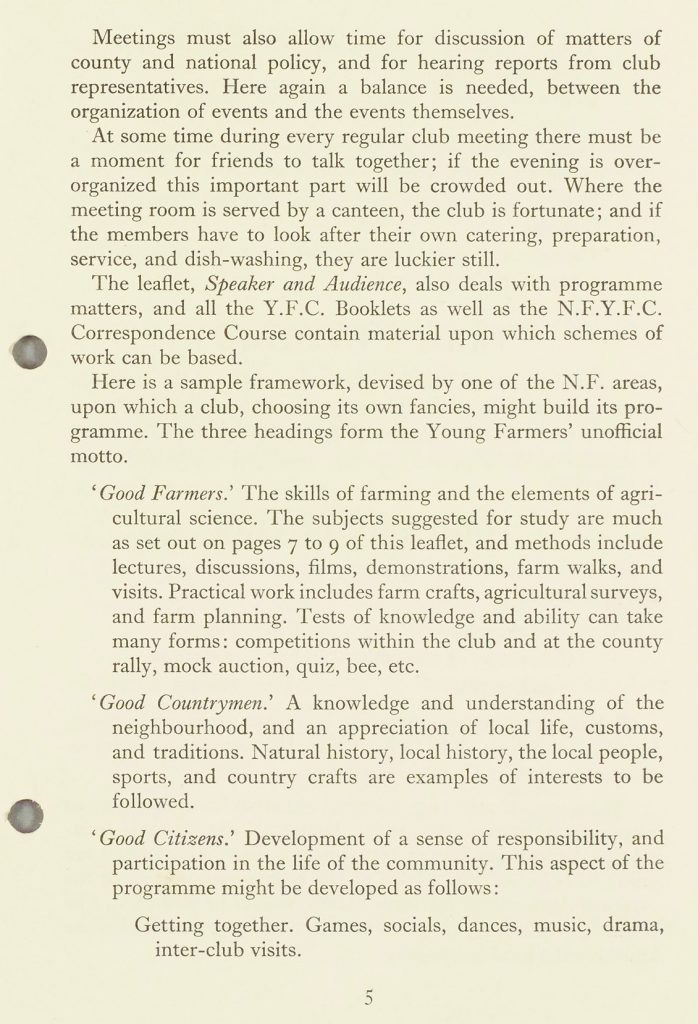
Good Farmers, Good Countrymen, Good Citizens in N.F.Y.F.C. ‘Club-Programmes’ Finding No 705.651 BA16163.2.6 © N.F.Y.F.C.
Whilst there is an emphasis on developing the skills of farming and agricultural science (through talks, demonstrations, film shows, farm visits and practical work such as farm crafts, planning and agricultural surveys) equally they see value in farmers understanding of their local community, customs and traditions, a readiness to develop knowledge of local and natural history, sports and country crafts and encouraging the testing of Young Farmers abilities through competitions such as the county Rally, quizzes and other challenges.
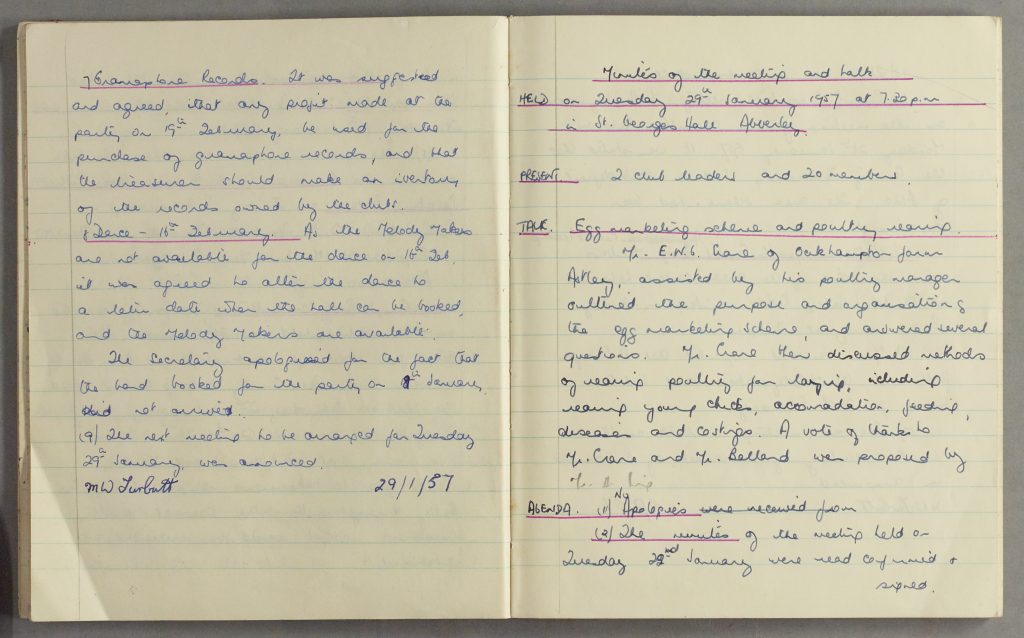
Minutes describing Egg Marketing scheme 29th January 1957 Finding No 705.651 BA5424 © A.D.Y.F.C.
It is only in recent years that mental wellbeing and the impact of poor mental health on farmers has been discussed openly. Earlier this year the BBC highlighted how farmers are being urged to talk more openly about their mental health and seek help and advice, with Farming Life reporting that mental health is one of the biggest problems facing UK Farmers. The importance of participation in the life of the community today, is as important to farmers of all ages as it was reported in the Club Programmes guidance, which saw the importance of Getting Together through Games, Socials, Dances, Music, Drama and inter-club visits and Talking Together with debate, discussions, public speaking, club meetings and committee work. National and international co-operation was encouraged through visits to other counties and other countries which is reflected in the records and recent publications from the National Federation of Young Farmers’ Clubs.
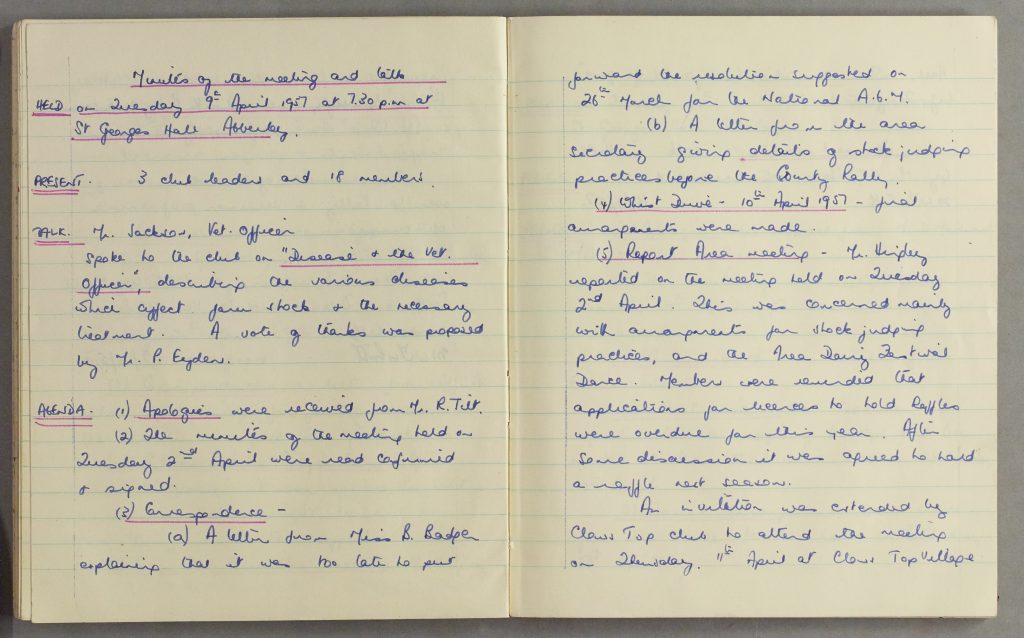
Minutes describing Disease the Vet talk 9th April 1957 Finding No 705.651 BA5454 © A.D.Y.F.C.
Minutes from A.D.Y.F.C. meetings reveal a wide ranging programme of education talks and films from ‘Quality Milk Production’ given by the County Livestock Manager looking at reasons for deficiencies in milk quality and how they can be overcome, ‘Egg Marketing and Poultry rearing’ (discussing methods of poultry rearing, including accommodation, feeding, diseases and costs) and from a talk on ‘Vegetables for the amateur’ which could be grown by the Pershore Institute of Horticulture (now operated by the RHS) to ‘Disease and the Vet Officer’ (the Vet Officer describing various diseases which affect farm stock and necessary treatments) and regular films about farming life from Shire horses, Sheep demonstrations to subjects such as the Denmark and Women’s Institute Activities.
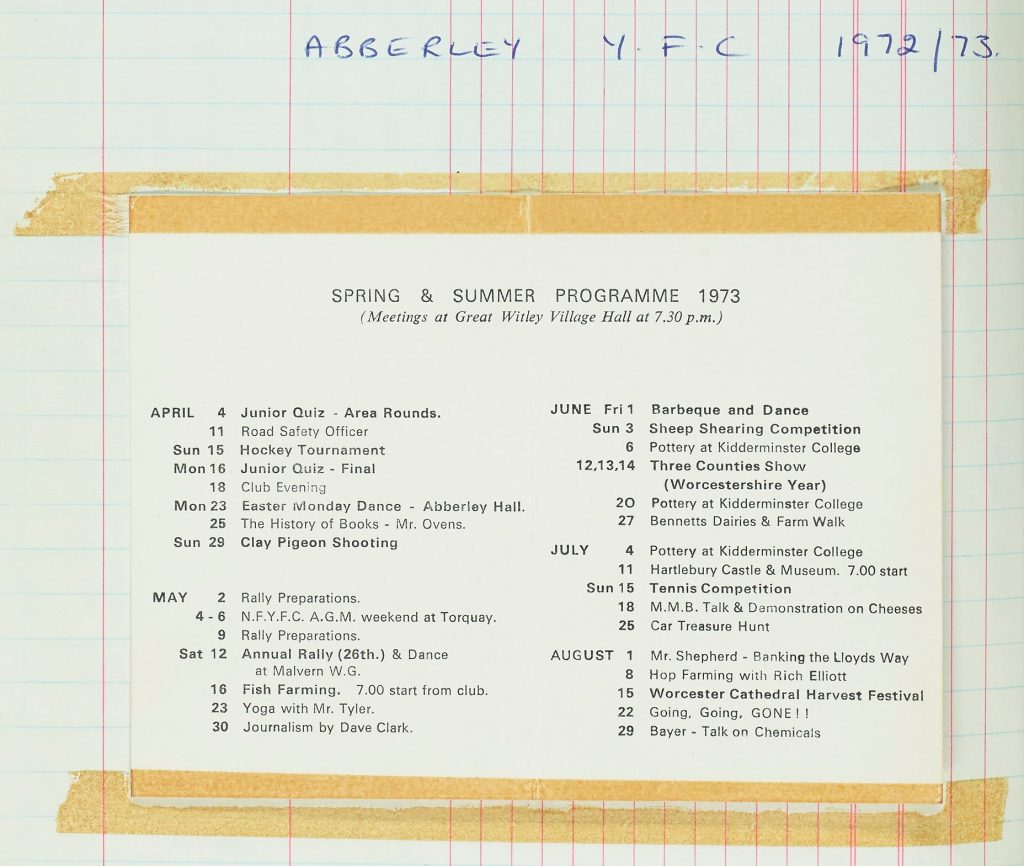
An example of the diverse activities offered by the A.D.Y.F.C. as part of the Spring-Summer 1973 Programme Finding No BA16163.2.1 © A.D.Y.F.C.
Y.F.C. competitions feature stock-judging, hedging, quizzes, floral arranging, fashion shows, athletics and sports such as hockey and football, beet singling (the weeding and thinning of sugar beet) with sheep shearing and ploughing matches hotly contested. Social dances, carol services and similar charity events are also regularly mentioned with money being raised for the local community on a regular basis.
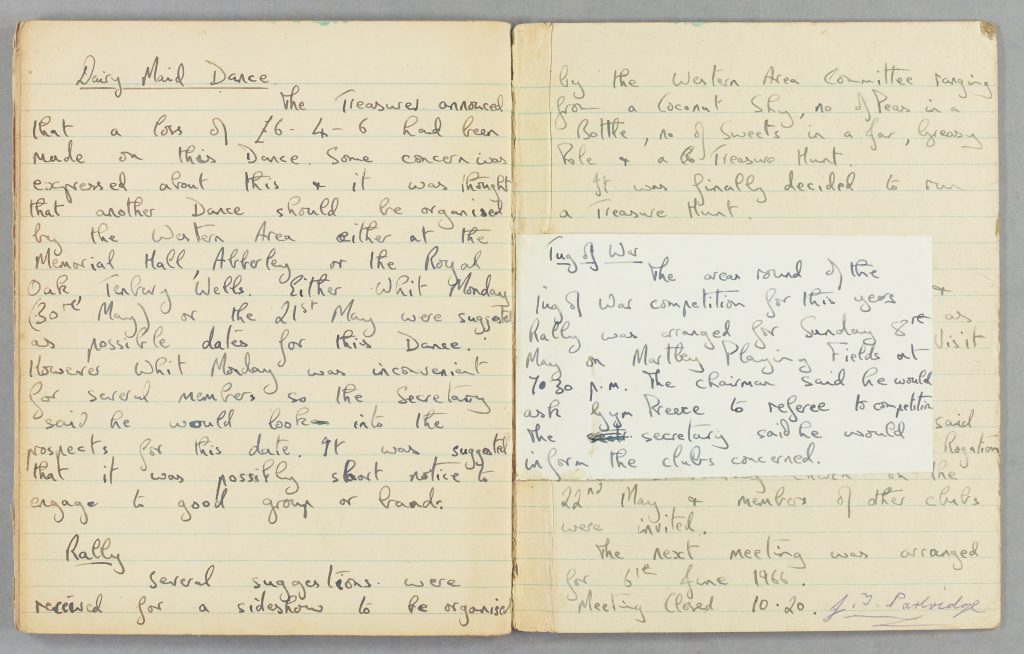
Discussion of the Dairy Maid Dance Rally and Tug of War at Finding No 705.651 BA16163.1.1 © A.D.Y.F.C.
Chiefly mentioned amongst all socials is The Dairy Maid Dance – a social dance which was run by many Young Farmers Clubs across the county, often in May with the crowning of a Dairy Maid Queen or Princess (and still is, as shown by Cheshire’s Y.F.C.) alongside the most talked about event of the year – the annual county Rally. The annual county Rally was and still is a fantastic opportunity for Young Farmers’ Clubs to get together and compete in activities such as stock-judging, tug-of-war, sheep shearing, show jumping, needlework, flower arranging, treasure hunts, tractor handling and Land Rover driving.
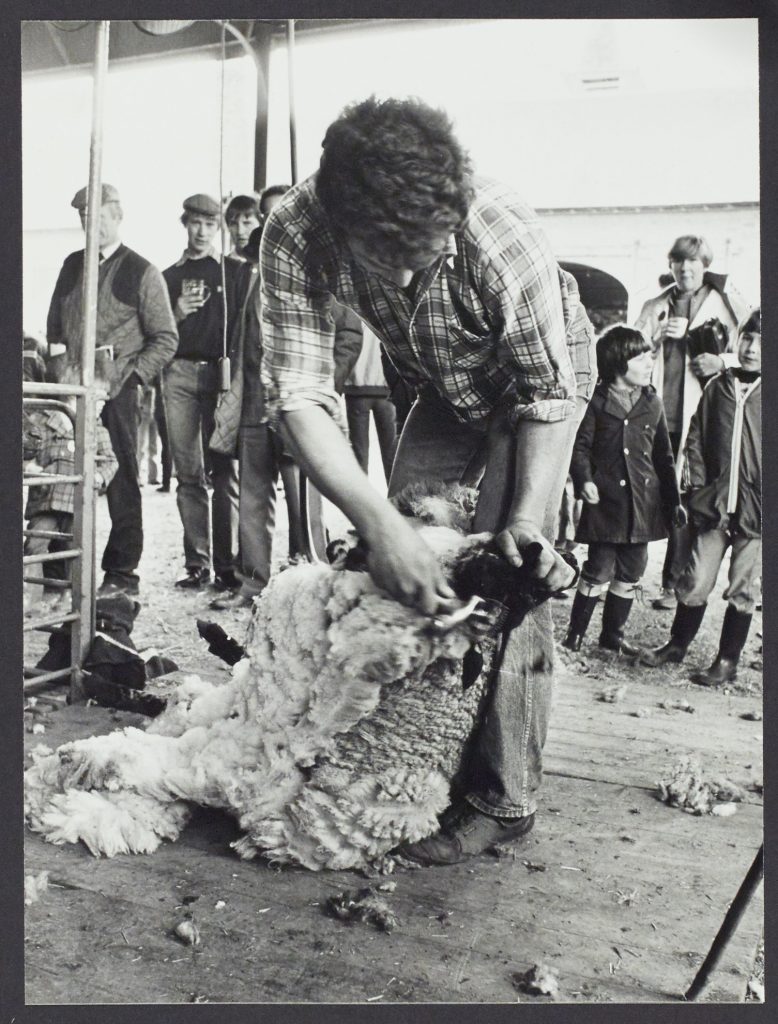
Sheepshearing at Young Farmers Club Rally Chapel Farm Netherton c.1983 WPS 57912 © Newsquest
The records of the Abberley Young Farmers Club illustrate the important contribution that Young Farmers Clubs provide in upskilling young people whether its practical activities such as learning about stock or crop rotation, building an understanding of agricultural issues and how to meet challenges or simply an opportunity to socialise and to meet like-minded people who share a passion for farming and the countryside. Today’s National Federation of Young Farmers Clubs continues to grow its membership, with an increase in under-18’s to their membership as demonstrated in their latest Annual Report and with a range of initiatives to engage young people to better deal with the future challenges facing farming and food production.
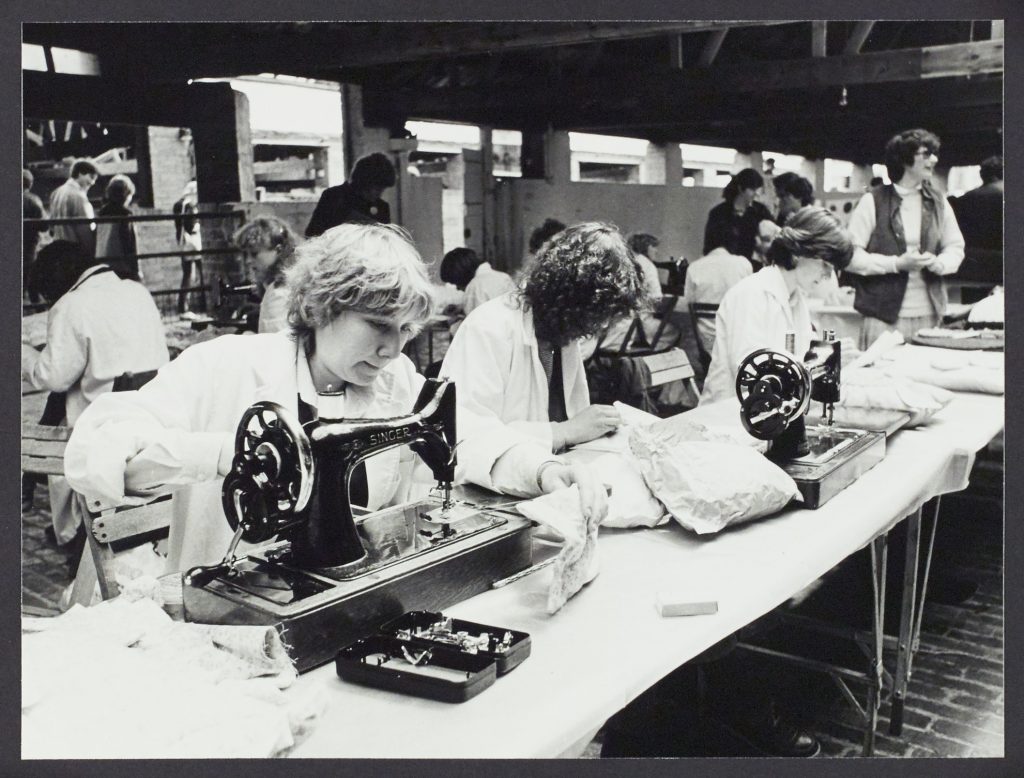
Competitors in the Senior Needlework Class at a Young Farmers Club Rally c.1983 WPS 57911 © Newsquest
Climate Change, the Covid-19 Pandemic, the war in Ukraine and resulting energy crisis has highlighted significant challenges for food production and self-sufficiency, such as coping with summer drought, increases in costs of fertiliser and feed for growing crops and livestock farming and the cost of machinery. This is alongside the uncertainty created by natural disasters such as the 2007 Floods, the 2001 Foot and Mouth outbreak and recently avian flu which can lead to catastrophic damage to farms and threaten livelihoods. Farmers now have a greater awareness of how farming contributes to Climate Change, such as through Greenhouse gas emissions. There is evidence that intensive agricultural methods have reduced biodiversity and degraded soils to levels suggesting from one study that only 60 years of harvests were left, but this has since been refuted by scientists. However, there are clear benefits to less intensive farming methods as shown with regenerative farming and rewilding alongside food production as shown by the success of the Knepp Estate.
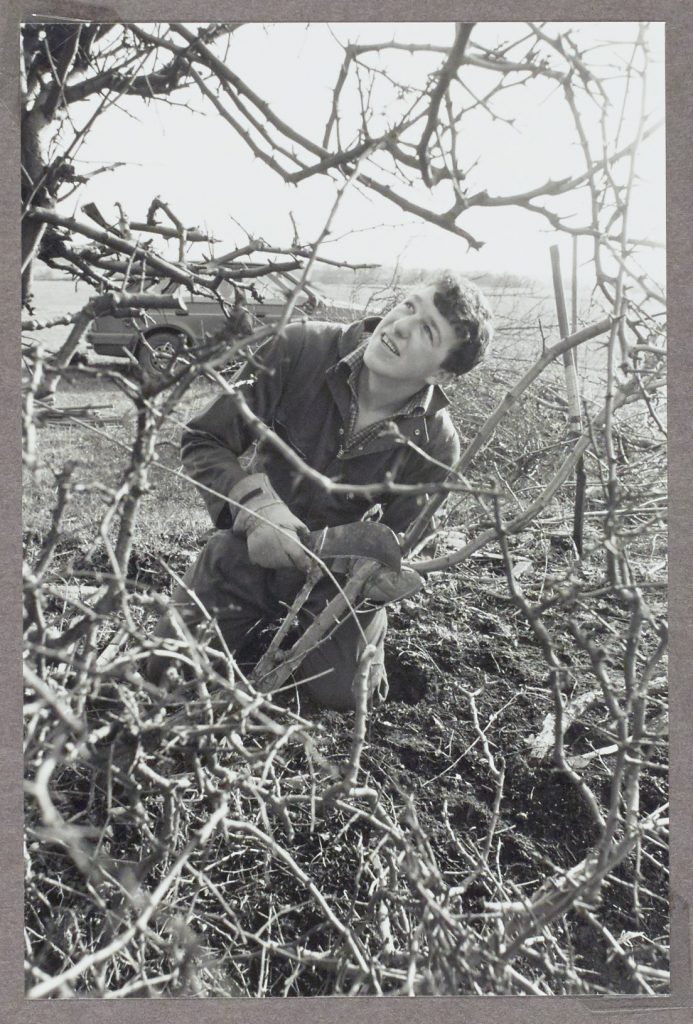
Andrew Smith Hedgelaying as part of a county event, Broomhall Farm, Kempsey c.1987 WPS 79424 © Newsquest
The N.F.Y.F.C.’s collaborative projects such as How Farming Can Cool The Planet with Young Farmers alongside the youth branch of the Land Workers Alliance exchanging ideas about how farming can help tackle climate change, visits to DEFRA, exchange visits abroad, farming podcasts and a National Young Farmers Week illustrate how Young Farmers Clubs are highly engaged in rural issues in their local communities, nationally and beyond. The archive of the Abberley and District Young Farmers Clubs illustrate how they have steadfastly supported the farming community and the National Federation of Young Farmers’ Clubs, which has a bright future ahead for an organisation already 90 years old!
Useful links/References:
The Calf Club Centenary group (Hemyock)
National Federation of Young Farmers’ Clubs
‘When Calf Clubs came to Devon’ Rural History Today, Issue 44, February 2023 p.4-5
Post a Comment